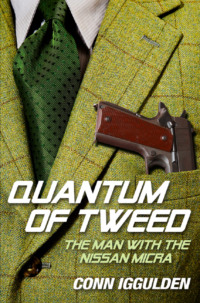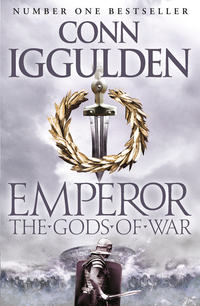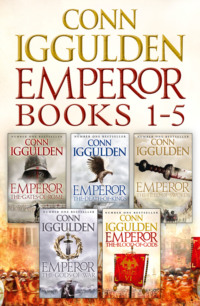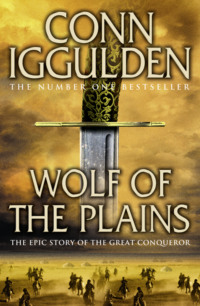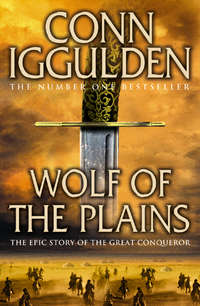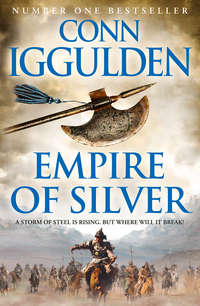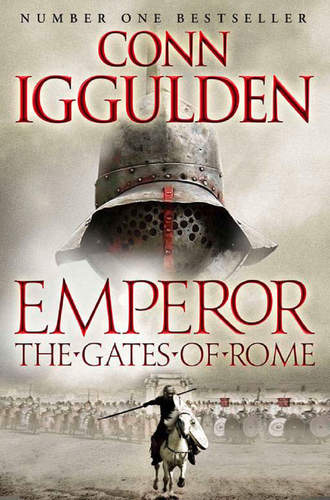
Полная версия
The Gates of Rome
‘A few days, perhaps a week. I wish it was more, but there is always work to be done for the Republic.’ He handed the reins to his son. ‘Take old Mercury here to the stables and rub him down properly. I’ll see you again after I have inspected the staff and spoken to your mother.’
Gaius’ open expression tightened at the mention of Aurelia and his father noticed. He sighed and put his hand on his son’s shoulder, making him meet his gaze.
‘I want to spend more time away from the city, lad, but what I do is important to me. Do you understand the word “Republic”?’
Gaius nodded and his father looked sceptical.
‘I doubt it. Few enough of my fellow senators seem to. We live an idea, a system of government that allows everyone to have a voice, even the common man. Do you realise how rare that is? Every other little country I have known has a king or a chief running it. He gives land to his friends and takes money from those who fall out with him. It is like having a child loose with a sword.
‘In Rome, we have the rule of law. It is not yet perfect or even as fair as I would like, but it tries to be and that is what I devote my life to. It is worth my life – and yours too when the time comes.’
‘I miss you, though,’ Gaius replied, knowing it was selfish.
His father’s gaze hardened slightly, then he reached out to ruffle Gaius’ hair once more.
‘And I miss you too. Your knees are filthy and that tunic is more suitable for a street child, but I miss you too. Go and clean yourself up – but only after you have rubbed Mercury down.’
He watched his son trudge away, leading the horse, and smiled ruefully. He was a little taller, Tubruk was right.
In the stables, Gaius rubbed the flanks of his father’s horse, smoothing away sweat and dust and thinking over his father’s words. The idea of a republic sounded very fine, but being a king was clearly more exciting.
Whenever Gaius’ father Julius had been away for a long absence, Aurelia insisted on a formal meal in the long triclinium. The two boys would sit on children’s stools next to the long couches, on which Aurelia and her husband would recline barefoot, with the food served on low tables by the household slaves.
Gaius and Marcus hated the meals. They were forbidden to chatter and sat in painful silence through each course, allowing the table servants only a quick rub of their fingers between dipping them into the food. Although their appetites were large, Gaius and Marcus had learned not to offend Aurelia by eating too quickly and so were forced to chew and swallow as slowly as the adults while the evening shadows lengthened.
Bathed and dressed in clean clothes, Gaius felt hot and uncomfortable with his parents. His father had put aside the informality of their meeting on the road and now talked with his wife as if the two boys did not exist. Gaius watched his mother closely when he could, looking for the trembling that would signal one of her fits. At first, they had terrified him and left him sobbing, but after years an emotional callousness had grown, and occasionally he even hoped for the trembling so that he and Marcus would be sent from the table.
He tried to listen and be interested in the conversation, but it was all about developments in the laws and city ordinances. His father never seemed to come home with exciting stories of executions or famous street villains.
‘You have too much faith in the people, Julius,’ Aurelia was saying. ‘They need looking after as a child needs a father. Some have wit and intelligence, I agree, but most have to be protected …’ She trailed off and silence fell.
Julius looked up and Gaius saw a sadness come into his face, making him look away, embarrassed, as if he had witnessed an intimacy.
‘Relia?’
Gaius heard his father’s voice and looked back at his mother, who lay like a statue, her eyes focused on some distant scene. Her hand trembled and suddenly her face twisted like a child’s. The tremor that began in her hand spread to her whole body and she twisted in spasm, one arm sweeping bowls from the low table. Her voice erupted violently from her throat, a torrent of screeching sound that made the boys wince backwards.
Julius rose smoothly from his seat and took his wife in his arms.
‘Leave us,’ he commanded and Gaius and Marcus went out with the slaves, leaving behind them the man holding the twisting figure.
The following morning, Gaius was woken by Tubruk shaking his shoulder.
‘Get up, lad. Your mother wants to see you.’
Gaius groaned, almost to himself, but Tubruk heard.
‘She is always quiet after a … bad night.’
Gaius paused as he pulled clothes on. He looked up at the old gladiator.
‘Sometimes, I hate her.’
Tubruk sighed gently.
‘I wish you could have known her as she was before the sickness began. She used to sing to herself all the time and the house was always happy. You have to think that your mother is still there, but can’t get out to you. She does love you, you know.’
Gaius nodded and smoothed his hair down carelessly.
‘Has my father gone back to the city?’ he asked, knowing the answer. His father hated to feel helpless.
‘He left at dawn,’ Tubruk replied.
Without another word, Gaius followed him through the cool corridors to his mother’s rooms.
She sat upright in bed, her face freshly washed and her long hair braided behind her. Her skin was pale, but she smiled as Gaius entered and he was able to smile back.
‘Come closer, Gaius. I am sorry if I scared you last night.’
He came into her arms and let her hold him, feeling nothing. How could he tell her he wasn’t scared any more? He had seen it too many times, each worse than the last. Some part of him knew that she would get worse and worse, that she was already leaving him. But he could not think of that – better to keep it inside, to smile and hug her and walk away untouched.
‘What are you going to do today?’ she asked as she released him.
‘Chores with Marcus,’ he replied.
She nodded and seemed to forget him. He waited for a few seconds and when there was no further response turned and walked from the room.
When the tiny space in her thoughts faded and she focused again on the room, it was empty.
Marcus met him at the gates, carrying a bird net. He looked into his friend’s eyes and made his tone light and cheerful.
‘I feel lucky today. We’ll catch a hawk – two hawks. We’ll train them and they’ll sit on our shoulders, attacking on our command. Suetonius will run when he sees us.’
Gaius chuckled and cleared his mind of thoughts of his mother. He missed his father already, but the day was going to be a long one and there was always something to do in the woods. He doubted Marcus’ idea of hawk-catching would work, but he would go along with it until the day was over and all the paths had been walked.
The green gloom almost made them miss the raven that sat on a low branch, not far from the sunlit fields. Marcus froze as he saw it first and pressed a hand against Gaius’ chest.
‘Look at the size of it!’ he whispered, unwrapping his bird net.
They crouched down and crept forward, watched with interest by the bird. Even for a raven it was large and it spread heavy black wings as they approached, before almost hopping to the next tree with one lazy flap.
‘You circle around,’ Marcus whispered, his voice excited. He backed this up with circling motions of his fingers and Gaius grinned at him, slipping into the undergrowth to one side. He crept around in a large circle, trying to keep the tree in sight while checking the path for dry twigs or rustling leaves.
When Gaius emerged on the far side, he saw the raven had changed tree again, this time to a long trunk that had fallen years before. The gentle slope of the trunk was easy to climb and Marcus had already begun to inch up it towards the bird, at the same time trying to keep the net free for throwing.
Gaius padded closer to the base of the tree. ‘Why doesn’t it fly away?’ he thought, looking up at the raven. It cocked its large head to one side and opened its wings again. Both boys froze until the bird seemed to relax, then Marcus levered himself upwards again, legs dangling on each side of the thick trunk.
Marcus was only feet from the bird when he thought it would fly off again. It hopped about on the trunk and branches, seemingly unafraid. He unfolded the net, a web of rough twine usually used for holding onions in the estate kitchens. In Marcus’ hands, it had instantly become the fearsome instrument of a bird-catcher.
Holding his breath, he threw it and the raven took off with a scream of indignation. It flapped its wings once again and landed in the slender branches of a young sapling near Gaius, who ran at it without thinking.
As Marcus scrambled down, Gaius shoved at the sapling and felt the whole thing give with a sudden crack, pinning the bird in the leaves and branches on the ground. With Gaius pressing it all down, Marcus was able to reach in and hold the heavy bird, gripped tightly in his two hands. He raised it triumphantly and then hung on desperately as the raven struggled to escape.
‘Help me! He’s strong,’ Marcus shouted and Gaius added his own hands to the struggling bundle. Suddenly an agonising pain shot through him. The beak was long and curved like a spear of black wood. It jabbed at his hand, catching and gripping the piece of soft flesh between thumb and first finger.
Gaius yelped. ‘Get it off. It’s got my hand, Marcus.’ The pain was excruciating and they panicked together, with Marcus fighting to hold his grip while Gaius tried to lever the vicious beak off his skin.
‘I can’t get it off, Marcus.’
‘You’ll have to pull it,’ Marcus replied grimly, his face red with the effort of holding the enraged bird.
‘I can’t, it’s like a knife. Let it go.’
‘I’m not letting it go. This raven is ours. We caught it in the wild, like hunters.’
Gaius groaned with pain.
‘It caught us, more like.’ His fingers waved in agony and the raven let go without warning, trying to snap at one of them. Gaius gasped in relief and backed off hurriedly, holding his hands against his groin and doubling over.
‘He’s a fighter, anyway,’ Marcus said with a grin, shifting his grip so the searching head couldn’t find his own flesh. ‘We’ll take him home and train him. Ravens are intelligent, I’ve heard. He’ll learn tricks and come with us when we go to the Campus Martius.’
‘He needs a name. Something war-like,’ Gaius replied, in between sucking his torn skin.
‘What’s the name of that god who goes round as a raven or carries one?’
‘I don’t know, one of the Greek ones, I think. Zeus?’
‘That’s an owl, I think. Someone has an owl.’
‘I don’t remember one with a raven, but Zeus is a good name for him.’
They smiled at each other and the raven went quiet, looking around him with apparent calmness.
‘Zeus it is then.’
They walked back over the fields to the estate with the bird held firmly in Marcus’ grasp.
‘We’ll have to find somewhere to hide him,’ he said. ‘Your mother doesn’t like us catching animals. You remember when she found out about the fox?’
Gaius winced, looking at the ground. ‘There’s an empty chicken coop next to the stables. We could put him in there. What do ravens eat?’
‘Meat, I think. They scavenge battlefields, unless that’s crows. We can get a few scraps from the kitchens and see what he takes, anyway. That won’t be a problem.’
‘We’ll have to tie twine to his legs for the training, otherwise he’ll fly off,’ Gaius said, thoughtfully.
Tubruk was talking to three carpenters who were to repair part of the estate roof. He spotted the boys as they walked into the estate yard and motioned them over to him. They looked at each other, wondering if they could run, but Tubruk wouldn’t let them get more than a few paces, for all his apparent inattention as he had turned back to the workers.
‘I’m not giving Zeus up,’ Marcus whispered harshly.
Gaius could only nod as they approached the group of men.
‘I’ll come along in a few minutes,’ Tubruk instructed as the men walked to their tasks. ‘Take the tiles off the section until I get there.’
He turned to the boys. ‘What’s this? A raven. Must be a sick one if you caught it.’
‘We trapped him in the woods. Followed him and brought him down,’ Marcus said, his voice defiant.
Tubruk smiled as if he understood and reached out to stroke the bird’s long beak. Its energy seemed to have gone and it panted almost like a dog, revealing a slender tongue between the hard blades.
‘Poor thing,’ Tubruk muttered. ‘Looks terrified. What are you going to do with him?’
‘His name’s Zeus. We’re going to train him as a pet, like a hawk.’
Tubruk shook his head once, slowly. ‘You can’t train a wild bird, boys. A hawk is raised from a chick by an expert and even they stay wild. The best trainer can lose one every now and then if it flies too far from him. Zeus is fully grown. If you keep him, he’ll die.’
‘We can use one of the old chicken coops,’ Gaius insisted. ‘There’s nothing in there now. We’ll feed him and fly him on a string.’
Tubruk snorted. ‘Do you know what a wild bird does if you keep him locked up? He can’t stand walls around him. Especially a tiny space like one of the chicken coops. It will break his spirit and, day by day, he will pull his own feathers out in misery. He won’t eat, he’ll just hurt himself until he dies. Zeus here will choose death over captivity. The kindest thing you can do for him is to let him go. I don’t think you could have caught him unless he was sick, so he might be dying anyway, but at least let him spend his last days in the woods and the air, where he belongs.’
‘But …’ Marcus fell silent, looking at the raven.
‘Come on,’ Tubruk said. ‘Let’s go out into the fields and watch him fly.’
Glumly, the boys looked at each other and followed him back out of the gates. Together, they stood gazing down the hill.
‘Set him free, boy,’ Tubruk said and something in his voice made them both look at him.
Marcus raised and opened his hands and Zeus heaved himself into the air, spreading large black wings and fighting for height. He screamed frustration at them until he was just a dot in the sky over the woods. Then they saw him descend and disappear.
Tubruk reached out and held the necks of the two boys in his rough hands.
‘A noble act. Now there are a number of chores to do and I couldn’t find you earlier, so they’ve piled up waiting for your attention. Inside.’
He steered the boys through the gate into the courtyard, taking a last look over the fields towards the woods before he followed them.
CHAPTER THREE

That summer saw the start of the boys’ formal education. From the beginning, they were both treated equally, with Marcus also receiving the training necessary to run a complex estate, albeit a minor one. In addition to continuing the formal Latin that had been drummed into them since birth, they were taught about famous battles and tactics as well as how to manage men and handle money and debts. When Suetonius left to be an officer in an African legion the following year, both Gaius and Marcus had begun to learn Greek rhetoric and the skills of debate that they would need if, as young senators later on, they ever chose to prosecute or defend a citizen on a matter of law.
Although the three hundred members of the Senate met only twice each lunar month, Gaius’ father Julius remained in Rome for longer and longer periods, as the Republic struggled to deal with new colonies and the swiftly growing wealth and power. For months, the only adults Gaius and Marcus would see were Aurelia and the tutors, who arrived at the main house at dawn and left with the sun sinking behind them and denarii jingling in their pockets. Tubruk was always there too, a friendly presence who stood no nonsense from the boys. Before Suetonius had left, the old gladiator had walked the five miles to the main house of the neighbouring estate and waited eleven hours, from dawn to dusk, to be admitted to see the eldest son of the house. He didn’t tell Gaius what had transpired, but had returned with a smile and ruffled Gaius’ hair with his big hand before going down to the stables to see to the new mares as they came into season.
Of all the tutors, Gaius and Marcus enjoyed the hours with Vepax the best. He was a young Greek, tall and thin in his toga. He always arrived at the estate on foot and carefully counted the coins he earned before walking back to the city. They met with him for two hours each week in a small room Gaius’ father had set aside for the lessons. It was a bare place, with a stone-flagged floor and unadorned walls. With the other tutors, droning through the verses of Homer and Latin grammar, the two boys often fidgeted on the wooden benches, or drifted in concentration until the tutor noticed and brought them back with sharp smacks from the cane. Most were strict and it was difficult to get away with much with only the two of them to take up the master’s attention. One time, Marcus had used his stylus to draw a picture of a pig with a tutor’s beard and face. He had been caught trying to show it to Gaius and had to hold out his hand for the stick, suffering miserably through three sharp blows.
Vepax didn’t carry a cane. All he ever had with him was a heavy cloth bag full of clay tablets and figures, some blue and some red to show different sides. By the appointed hour, he would have cleared the benches to one side of the room and set out his figures to represent some famous battle of the past. After a year of this, their first task was to recognise the structure and name the generals involved. They knew Vepax would not limit himself to Roman battles; sometimes the tiny horse and legionary figures were representing Parthia or ancient Greece or Carthage. Knowing Vepax was Greek himself, the boys had pushed the young man to show them the battles of Alexander, thrilled by the legends and what he had achieved at such a young age. At first, Vepax had been reluctant, not wanting to be seen to favour his own history, but he had allowed himself to be persuaded and showed them every major battle where records and maps survived. For the Greek wars, Vepax never opened a book, placing and moving each piece from memory.
He told the boys the names of the generals and the key players in each conflict as well as the history and politics when they had a direct bearing on the day. He made the little clay pieces come alive for Marcus and Gaius, and every time it came to the end of the two hours they would look longingly at them as he packed them away in his bags, slowly and carefully.
One day, as they arrived, they found most of the little room covered in the clay characters. A huge battle had been set out and Gaius counted the blue characters quickly, then the red, multiplying it in his head as he had been taught by the arithmetic tutor.
‘Tell me what you see,’ Vepax said quietly to Gaius.
‘Two forces, one of more than fifty thousand, the other nearly forty. The red is … the red is Roman, judging by the heavy infantry placed to the front in legion squares. They are supported by cavalry on the right and left wings, but they are matched by the blue cavalry facing them. There are slingers and spearmen on the blue side, but I can’t see any archers, so missile attacks will be over a very short range. They seem roughly matched. It should be a long and difficult battle.’
Vepax nodded. ‘The red side is indeed Roman, well-disciplined veterans of many battles. What if I told you the blues were a mixed group, made up of Gauls, Spaniards, Numidians and Carthaginians? Would that make a difference to the outcome?’
Marcus’ eyes gleamed with interest. ‘It would mean we were looking at Hannibal’s forces. But where are his famous elephants? Didn’t you have elephants in your bag?’ Marcus looked hopefully over at the limp cloth sack.
‘It is Hannibal the Romans were facing, but by this battle, his elephants had died. He managed to find more later and they were terrifying at the charge, but here he had to make do without them. He is outnumbered by two legions. His force is mixed where the Roman one is unified. What other factors might affect the outcome?’
‘The land,’ Gaius cried. ‘Is he on a hill? His cavalry could smash …’
Vepax waved a hand gently.
‘The battle took place on a plain. The weather was cool and clear. Hannibal should have lost. Would you like to see how he won?’
Gaius stared at the massed pieces. Everything was against the blue forces. He looked up.
‘Can we move the pieces as you explain?’
Vepax smiled. ‘Of course. Today I will need both of you to make the battle move as it did once before. Take the Roman side, Gaius. Marcus and I will take Hannibal’s force.’
Smiling, the three faced each other over the ranks of figures.
‘The battle of Cannae, one hundred and twenty-six years ago. Every man who fought in the battle is dust, every sword rusted away, but the lessons are still there to be learned.’
Vepax must have brought every clay soldier and horse he had to form this battle, Gaius realised. Even with each piece representing a five hundred, they took up most of the available room.
‘Gaius, you are Aemilius Paulus and Terentius Varro, experienced Roman commanders. Line by line you will advance straight at the enemy, allowing no deviation and no slackness in discipline. Your infantry is superb and should do well against the ranks of foreign swordsmen.’
Thoughtfully, Gaius began moving his infantry forward, group by group.
‘Support with your cavalry, Gaius. They must not be left behind or you could be flanked.’
Nodding, Gaius brought the small clay horses up to engage the heavy cavalry Hannibal commanded.
‘Marcus. Our infantry must hold. We will advance to meet them, and our cavalry will engage theirs on the wings, holding them.’
Heads bowed, all three moved figures in silence until the armies had shifted together, face to face. Gaius and Marcus imagined the snorts of the horses and the war cries splitting the air.
‘And now, men die,’ Vepax murmured. ‘Our infantry begin to buckle in the centre as they meet the best-trained enemy they have ever faced.’ His hands flew out and switched figure after figure to new positions, urging the boys along as they went.
On the floor in front of them, the Roman legions pushed back Hannibal’s centre, which buckled before them, close to rout.
‘They cannot hold,’ Gaius whispered, as he saw the great crescent bow that grew deeper as the legions forced themselves forward. He paused and looked over the whole field. The cavalry were stationary, held in bloody conflict with the enemy. His mouth dropped as Marcus and Vepax continued to move pieces and suddenly the plan was clear to him.
‘I would not go further in,’ he said and Vepax’s head came up with a quizzical expression.
‘So soon, Gaius? You have seen a danger that neither Paulus nor Varro saw until it was too late. Move your men forward, the battle must be played out.’ He was clearly enjoying himself, but Gaius felt a touch of irritation at having to follow through moves that would lead to the destruction of his armies.
The legions marched through the Carthaginian forces and the enemy let them in, falling back quickly and without haste, losing as few men as possible to the advancing line. Hannibal’s forces were moving from the back of the field to the sides, swelling the trap, and, after what Vepax said was only a couple of hours, the entire Roman force was submerged in the enemy on three sides, which slowly closed behind them until they were caught in a box of Hannibal’s making. The Roman cavalry were still held by equally skilled forces and the final scene needed little explanation to reveal the horror of it.




